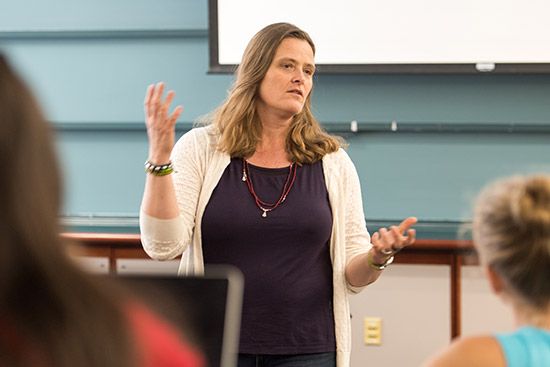One Class, One Day: Today’s Assignment Is to Meditate
SED course studies effects of mindfulness on performance

Lani Silversides, a part-time student from Andover, Mass., (left) and Shana Jones (SED’18) meditate during a School of Education summer class on how the practice enhances sports, arts, and other performances.
Class by class, lecture by lecture, question asked by question answered, an education is built. This is one of a series of visits to one class, on one day, in search of those building blocks at BU.
In any other class, you might think Amy Baltzell’s 10 students are staging a sit-in as they stand in unison, leave books and laptops behind to scatter around the room, and plop down on the floor. But in this class, they’re merely following their teacher’s order.
Baltzell (SED’96,’99), perched on the desk at the front of the room with her eyes shut, intones soothing directions in between long stretches of quiet:
“I’d like you, with each in breath, to bring that one thing you wish most for yourself, say it to yourself as you breathe in.”
“Let’s try today to think of what you might wish for everyone in this room, this class—‘May you be at ease’ or ‘Be at peace.’”
No one here took a wrong turn at the ashram. Mindfulness and Performance, taught for the past seven summers by Baltzell, a School of Education clinical associate professor, offers students hands-on practice in meditation, as well as instruction about the effects of mindfulness on performance in sports, arts, and education. (The scholarly definition of mindfulness is “open-hearted, moment-to-moment, nonjudgmental awareness” that can be developed by techniques like meditation.)
An outside meditation expert led the first few classes, instructing students in how to meditate. Sports psychology expert, licensed psychologist, and coach-athlete Baltzell (a member of the 1992 Olympic rowing team and the 1995 America’s Cup All-Women’s Sailing Team) began meditating when her sister, a longtime practitioner who had just been diagnosed with stage 4 cancer, invited her to a session. (Her sister, initially given 18 months to live, is “still doing well” 9 years later, Baltzell says.)
“I found that with consistent practice, I was much less reactive to challenges, frustrations,” she says. “I began to notice a calmer response to difficulty.” She began researching meditation’s effects on performance.
The goal of the class is to instruct students how to perform well at difficult moments, such as when they’ve made a mistake—on the field, the court, or the stage. “You don’t have to be confident to perform well,” Baltzell says. “With courage through self-compassion fostered by meditation, you have to direct your attention to factors that help with performance.”
“Anyone can take the class,” she adds. “The course can resonate with anyone,” although with its performance emphasis, this summer’s students included a classical musician, a theater actor and producer, and an elementary school teacher.

Meditation has been researched for its ability to reduce stress, help prisoners address anxiety and violent tendencies, and enhance sports performance. Baltzell has researched the latter, and following their 10-minute meditative sit-in, her students listen to her lecture on how to introduce athletes to the practice.
If you tell them to just breathe in, breathe out, she says, “they’re going to run away,” dismissing the whole idea. The best approach is to frame it as an act of courage and “self-compassion.” One way is to have an athlete think about a difficult moment that occurred in their sport—“maybe they choked,” Baltzell says—and then think about what they most needed to hear in that moment that would have soothed them.
She asks cellist Naomi Steckman (CFA’18) for a comparably tough moment in music. “Just being out of tune,” Steckman answers. What thought might make you want to keep playing, Baltzell presses. “Thinking of Yo-Yo Ma,” comes the answer.
“Can you imagine Yo-Yo Ma saying, ‘It’s no big deal, just keep going’?” Baltzell suggests. An icon in the field can serve as a useful meditation trigger that appeals to an entire team or musical group. “If the negative feeling comes up—that’s how champions feel, that’s how Yo-Yo Ma feels.”
Kelsey Beer (CAS’18) had procrastinated about her interest in practicing mindfulness before taking the course. Its focus on meditation in sports appealed to both the basketball fan and psychology major in her. Now that she’s taken the class, Beer says, she can see herself continuing to meditate, “which is not what I expected to say when I first started.”
The course opened her eyes to what meditation can and cannot do. “It’s being able to sit with your thoughts and accept them. It’s not pushing them away,” she says. “There’s this idea of meditation being calming and great all the time, and it’s not. There are going to be times where it’s bad.…You can’t expect it to always be a perfect meditation.”
But that’s OK. She had a tough week, Beer says, but the day before, her mindfulness practice had gone well, reinforcing the class’ insight that a bad stretch “doesn’t mean it’s not ever going to get better.…This is a way of dealing with the thoughts and emotions that you have and finding better ways to cope.”
Beer is leaning toward becoming a psychologist after graduation, and if she does, the class has ensured she’ll have a mindfulness-based practice.
This Series
Also in
One Class, One Day
-
February 27, 2019
A Class That Explores the Gospel According to Tupac Shakur
-
December 17, 2018
Nuclear Governance Class Offers Context to Current Headlines
-
November 30, 2018
Breaking Bad Director Gives CAS Class the Inside Dope
Comments & Discussion
Boston University moderates comments to facilitate an informed, substantive, civil conversation. Abusive, profane, self-promotional, misleading, incoherent or off-topic comments will be rejected. Moderators are staffed during regular business hours (EST) and can only accept comments written in English. Statistics or facts must include a citation or a link to the citation.